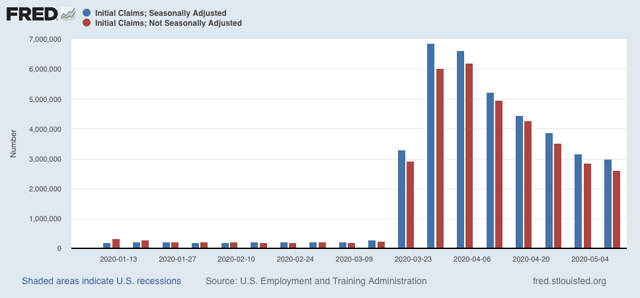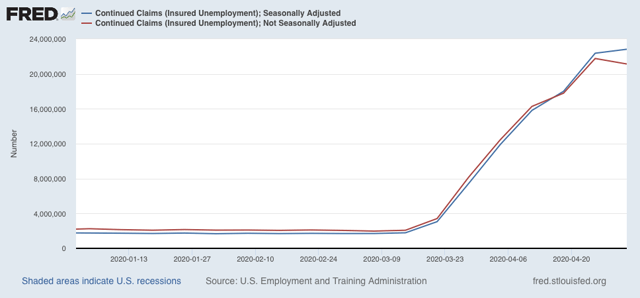Summary:
Jobless claims show new damage ongoing, but some damage repaired Now that we have more than one month of data from initial and continuing jobless claims since the coronavirus lockdowns started, we can finally begin to trace whether the economic impacts of the virus are being contained, or are continuing to spread out into further damage. Eight weeks in, the answer is mixed. First, let’s look at initial jobless claims both seasonally adjusted (blue) and non- seasonally adjusted (red). The non-seasonally adjusted number is of added importance since seasonal adjustments should not have more than a trivial effect on the huge real numbers: There were 2.614 million new claims, which after the seasonal adjustment became 2.981 million. By now, virtually all
Topics:
NewDealdemocrat considers the following as important: US/Global Economics
This could be interesting, too:
Jobless claims show new damage ongoing, but some damage repaired Now that we have more than one month of data from initial and continuing jobless claims since the coronavirus lockdowns started, we can finally begin to trace whether the economic impacts of the virus are being contained, or are continuing to spread out into further damage. Eight weeks in, the answer is mixed. First, let’s look at initial jobless claims both seasonally adjusted (blue) and non- seasonally adjusted (red). The non-seasonally adjusted number is of added importance since seasonal adjustments should not have more than a trivial effect on the huge real numbers: There were 2.614 million new claims, which after the seasonal adjustment became 2.981 million. By now, virtually all
Topics:
NewDealdemocrat considers the following as important: US/Global Economics
This could be interesting, too:
Joel Eissenberg writes How Tesla makes money
Angry Bear writes True pricing: effects on competition
Angry Bear writes The paradox of economic competition
Angry Bear writes USMAC Exempts Certain Items Coming out of Mexico and Canada
Jobless claims show new damage ongoing, but some damage repaired
Now that we have more than one month of data from initial and continuing jobless claims since the coronavirus lockdowns started, we can finally begin to trace whether the economic impacts of the virus are being contained, or are continuing to spread out into further damage.
Eight weeks in, the answer is mixed.
First, let’s look at initial jobless claims both seasonally adjusted (blue) and non- seasonally adjusted (red). The non-seasonally adjusted number is of added importance since seasonal adjustments should not have more than a trivial effect on the huge real numbers:
There were 2.614 million new claims, which after the seasonal adjustment became 2.981 million.
By now, virtually all of the people laid off due to the initial lockdowns in March and early April should have already applied for benefits. Further, last week was the first week after some States “reopened.” Thus these new claims are almost certainly primarily represent the spreading second-order impacts of the coronavirus shutdowns. In other words, this is evidence that new economic damage continued to spread, and in a very large way.
Next, looking at continuing claims, which lag one week behind, we see a slight (-3%) decline in the non-seasonally adjusted number (red). The less important seasonally adjusted number (blue) rose:
This tells us that, as of two weeks ago, although the new damage was spreading (I.e., the initial claims), there were enough callbacks to work to slightly outweigh that new damage. In a very, very limited sense that is “good” news. But if “reopening” leads to a significant new upturn in cases, it is likely to be a very short-lived positive trend.


